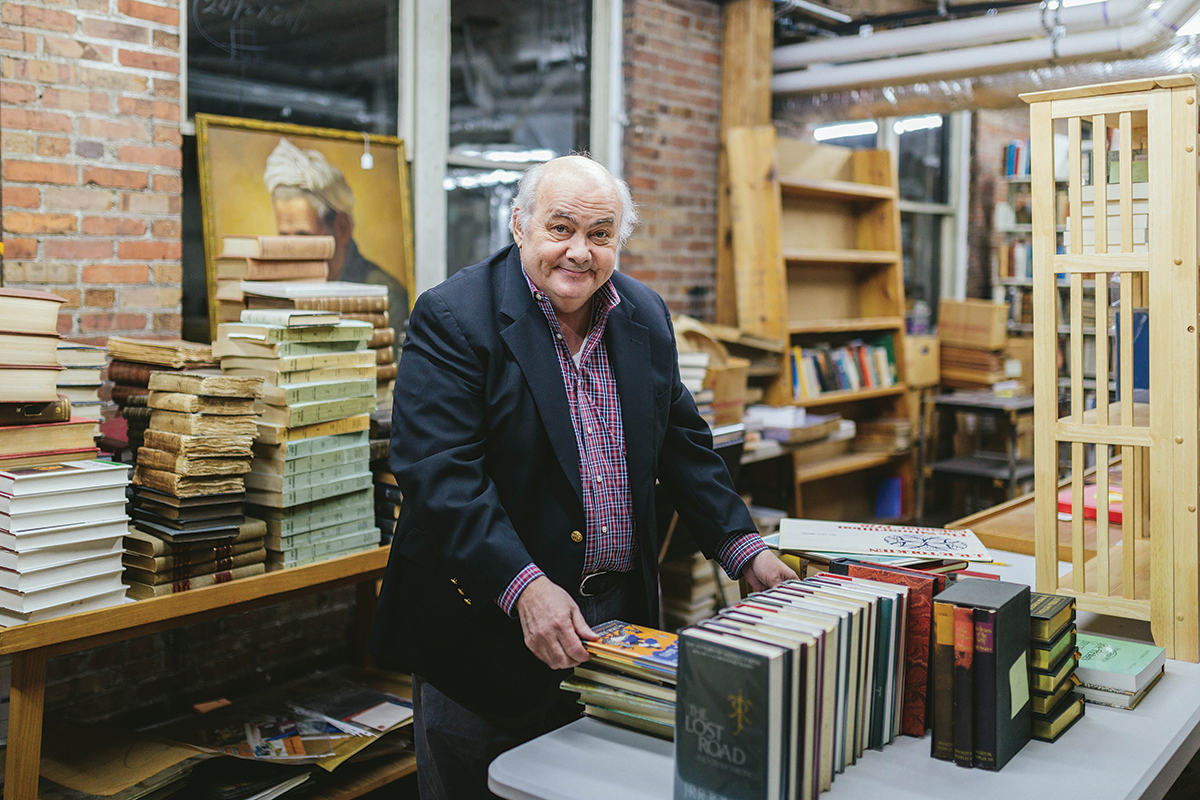Fantasy scholar delves deeper into Middle Earth

Stan Shelley’s inventory is a treasure trove of Inklings editions and memorabilia.
Portrait by Rachel Pressley
With the new Lord of the Rings: Rings of Power series set to debut this year, a lot of people are diving back into Middle Earth and the seemingly ubiquitous tales that unfold in J.R.R Tolkien’s beloved books and in the ongoing screen adaptations.
“Ringers,” “Tolkienites,” and “Tolkiendils” can all claim various rights of fandom, but some scholars have dedicated their entire careers to studying and promoting Tolkien, C.S. Lewis, and other early fantasy writers known as the “Inklings.” Stan Shelley has been in the rare-books game for 20 years, and his Hendersonville store, Shelley & Son Books, specializes in the works of the Inklings and their peers.
Shelley delivers a lecture on Tolkien this month at Blue Ridge Community College’s Center for Lifelong Learning.
We all know the basic works of Tolkien, but why is his legacy so distinct?
Tolkien was a philologist [who] created languages and words. He invented three or four languages before he was even in college. And he kept developing Elvish, and pretty soon he realized that, just like in English, words had to have a history … so creating that history sort of evolved into the history of Middle Earth.
He had the setting for the story long before he ever wrote the story. Everyone else had a story to tell and they’d create a setting for that story. Tolkien did it in reverse, and that’s what was so revolutionary.

Photo by Rachel Pressley
And that approach became the standard…
Tolkien and C.S. Lewis completely changed the world of fantasy and faerie stories, and everybody after roughly 1960 who writes in those fields is influenced by those two men, whether they know it or not. When you go into a bookstore now and there’s a whole series by Robert Jordan or there are all of these series with multiple volumes, every one of those people were influenced by Tolkien in the way that he created whole worlds within his fantasy. The game Dungeons & Dragons, all of these online games that you can play now — they all have to tip their hat to Tolkien. It’s a pretty remarkable achievement.
His career went much further than The Hobbit and Lord of the Rings. There was just a major theatrical release of the Green Knight, of which Tolkien had a famous translation, and he had other significant impacts in ancient literature, right?
Yes. [For instance], prior to Tolkien, Beowulf was considered an Old English poem that could give us a window into life in those early centuries. Tolkien wrote a book, Beowulf: the Monsters and the Critics, in which he approached it not as a window into a different time, but as real literature.
And everybody saw that he was right, so since then, Beowulf has been studied primarily as a great poem.
The Blue Ridge Center for Lifelong Learning hosts Stan Shelley’s seminar on J.R.R Tolkien Tuesday, March 22, 1-3pm (Room 233 in the Sink Building, Blue Ridge Community College, 180 West Campus Drive, Flat Rock), facilitated by Mary Johnston. For more information, call 828-694-1740, e-mail brcll@blueridge.edu, or visit brcll.com.




What a fabulous insight into the more substantial nature of Tolkien and C.S. Lewis. I am pleased to read this article. Will attend the lecture.
Thanks